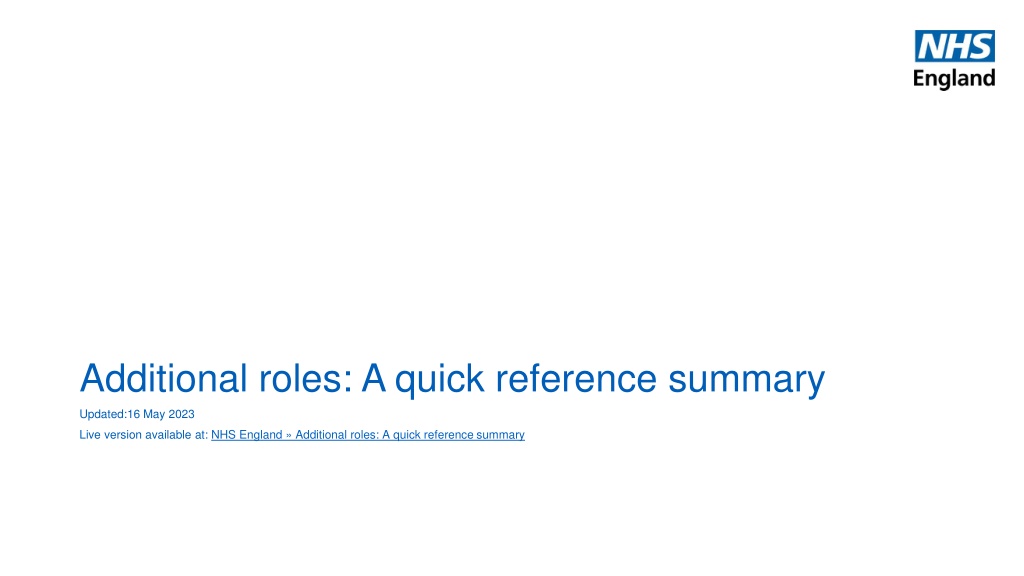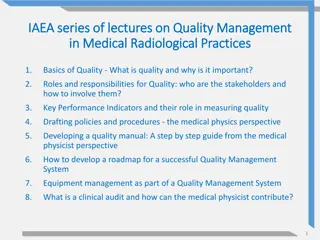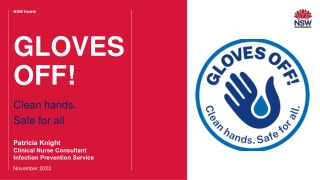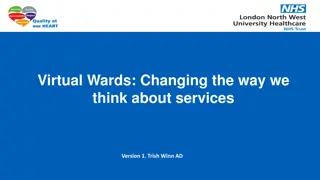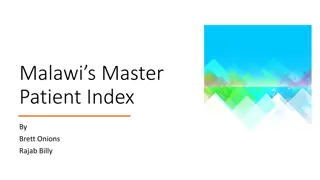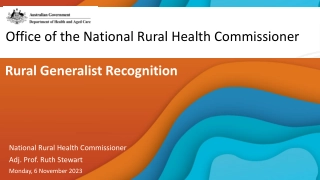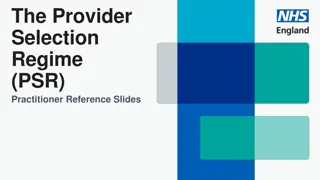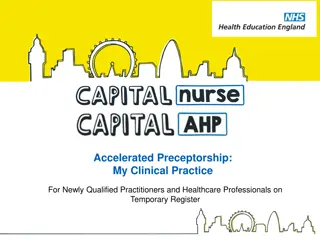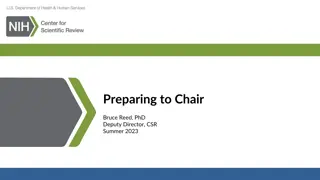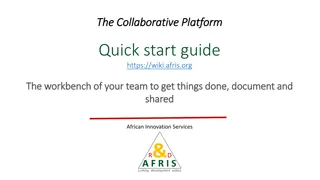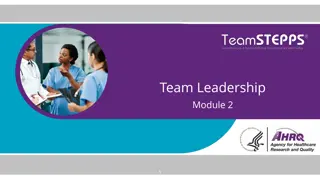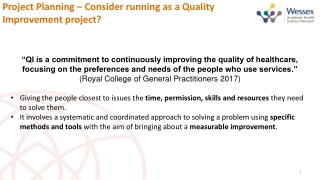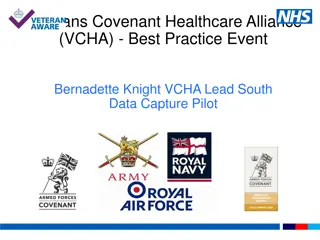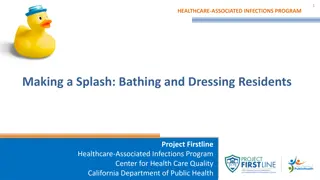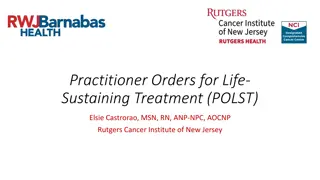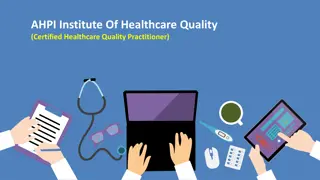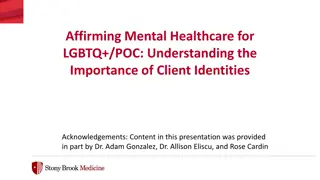Healthcare Professional Roles Quick Reference
Roles like Clinical Pharmacist, Pharmacy Technician, Social Prescribing Link Worker, and Health & Wellbeing Coach have distinct education, training, supervision, and responsibilities to support patient care and medication management. From conducting medication reviews to connecting individuals with community resources, these roles play crucial parts in holistic healthcare delivery.
Download Presentation
Please find below an Image/Link to download the presentation.
The content on the website is provided AS IS for your information and personal use only. It may not be sold, licensed, or shared on other websites without obtaining consent from the author. Download presentation by click this link. If you encounter any issues during the download, it is possible that the publisher has removed the file from their server.
Presentation Transcript
Additional roles: A quick reference summary Updated:16 May 2023 Live version available at: NHS England Additional roles: A quick reference summary
Clinical/senior pharmacist Education and training requirements Recommended minimum supervision Key roles and responsibilities Conducts structured medication reviews (SMRs) Independent prescribing/deprescribing Provides medication advice to healthcare professionals and patients Optimises medication (e.g. antibiotic stewardship) Translates medicines national policies into local implementation Adopts a whole system approach to medicines management Clinical pharmacists must be supervised by a senior or advanced practice pharmacist at least once a month, with access to a GP for support/development Senior clinical pharmacists must be supervised by a GP or advanced practice pharmacist at least once every 3 months Registered with the General Pharmaceutical Council (GPhC) Enrolled in or qualified from an approved training programme, e.g. Primary care pharmacy education pathway (PCPEP) or equivalent Pharmacy technician Education and training requirements Recommended minimum supervision Key roles and responsibilities Registered with the General Pharmaceutical Council (GPhC) Enrolled in or qualified from an approved training programme that meets the National Competency Framework for Primary Care Pharmacy Technicians or, for example, Primary care pharmacy education pathway (PCPEP) Supports SMRs Counsels patients on medicines Manages prescriptions Conducts medicines reconciliation Conducts medicines audits Supervision can be carried out monthly by a pharmacist 2 |
Social prescribing link worker Education and training requirements Recommended minimum supervision Key roles and responsibilities Completed the eLearning for Health online programme Social Prescribing learning for link workers Enrolled in or qualified from appropriate training as accredited by the Personalised Care Institute Attends the peer support networks delivered at place or system by the integrated care system (ICS) and/or NHS England in the region Connects people to non-medical community- based activities, groups and services that meet practical, social and emotional needs, including specialist advice services and the arts, physical activity and nature Helps people identify issues that affect their health and wellbeing when co-producing a personalised care and support plan A named first point of contact in the PCN (including a GP); including access to monthly supervision from an appropriate health professional (e.g. allied health professional, GP) Further guidance on supervision, education and training can be found in the workforce development framework for social prescribing link workers. Health and wellbeing coach Education and training requirements Recommended minimum supervision A named first point of contact in the PCN (including a GP). Should have access to monthly supervision from an appropriate member of the MDT including an advanced practitioner and health coaching mentor. Group coaching supervision is also encouraged. Further guidance on supervision, education and training can be found in the workforce development framework for health and wellbeing coaches. Key roles and responsibilities Uses coaching skills to support people to make conscious and informed health choices, change behaviours and encourage proactive management and prevention of illness. Works closely with MDT colleagues, including link workers, to provide access to self- management education, peer support and social prescribing Undertaking or qualified from appropriate four- day health coaching training as accredited by the Personalised Care Institute. 3 |
Care co-ordinator Education and training requirements Recommended minimum supervision Key roles and responsibilities Provides co-ordination and navigation through the health and care systems Facilitates joint working across organisations and MDTs Makes referrals to services and other health and care professionals Helps patients prepare for/follow-up Supports patients to book appointments Signposts patients to information Works in partnership with MDT colleagues including social prescribing link worker(s) and health and wellbeing coach(es) Enrolled in, undertaking or qualified from appropriate two-day care co-ordination training as accredited by the Personalised Care Institute Accredited e-learning completed in personalised care and support planning and shared decision making. A named first point of contact in the PCN (including GP). Monthly supervision can be provided by an appropriate member of the MDT including an advanced practitioner. Further guidance on supervision, education and training can be found in the workforce development framework for care co-ordinators. Dietitian Education and training requirements Recommended minimum supervision Key roles and responsibilities Provides specialist dietetics advice to address, for example, diabetes, weight management, food allergies, and coeliac, gastrointestinal or metabolic diseases Prescribes medication within scope Educates and supports patients Should have access to monthly supervision from a GP, consultant practitioner or advanced practitioner. Should also have an appropriate named individual in the PCN to provide general advice and support on a day-to-day basis Educated to bachelors/master s degree level (or equivalent) Registered with the Health and Care Professions Council (HCPC) Able to operate at an advanced level of practice 4 |
First contact physiotherapist Education and training requirements Recommended minimum supervision Key roles and responsibilities Assesses, diagnoses, treats and manages musculoskeletal (MSK) problems Prescribes medication within scope Develops skills relating to injection therapy Performs diagnostic investigations Signposts/refers to health and care services Audits of health and care practice Requests/progresses investigations Educated to undergraduate degree in physiotherapy level Master s level qualification or equivalent Registered with the Health and Care Professions Council (HCPC) Demonstrates working at education (master s) Level 7 with competence and capability in MSK- related areas of practice (or equivalent) Expected to work independently without day-to- day supervision Should have access to monthly supervision from an appropriate clinician, e.g. GP, consultant practitioner, advanced practitioner Paramedic Education and training requirements Recommended minimum supervision Key roles and responsibilities Assesses and triages calls from patients Performs home visits for urgent assessment Advises and signpost patients Supports anticipatory care plans Manages minor illness Educated to degree/diploma level in paramedicine or equivalent Registered with the Health and Care Professions Council (HCPC) Acquired 5 years of post-registration experience If the paramedic is undertaking first contact practitioner (FCP) training, should have access to daily debriefs with roadmap supervisor. Otherwise support from clinicians signed off at clinical practice master s level or equivalent 5 |
Occupational therapist Education and training requirements Recommended minimum supervision Key roles and responsibilities Helps people find ways to continue with everyday activities, e.g. learning new ways to do things or changing their environment to make things easier Creates condition management plans Advises and signpost patients Educated to bachelor/master s degree level (or equivalent, eg diploma) Registered with the Health and Care Professions Council (HCPC) Able to operate at first contact practice and an advanced level of practice Should have access to monthly supervision from a GP, consultant practitioner or advanced practitioner. Should also have an appropriate named individual in the PCN to provide general advice and support on a day-to-day basis Podiatrist Education and training requirements Recommended minimum supervision Key roles and responsibilities Diagnoses, treats and manages foot problems that arise from vascular, diabetic inflammatory or MSK disease Performs minor surgery, e.g. to manage in- growing great toenails and verrucae Prescribes, produces and fits orthotics and additional aids and appliances as appropriate Educated to bachelor/master s degree level (or equivalent) Registered with the Health and Care Professions Council (HCPC) Able to operate at first contact practice and an advanced level of practice Should have access to monthly supervision from a GP, consultant practitioner or advanced practitioner. Should also have an appropriate named individual in the PCN to provide general advice and support on a day-to-day basis 6 |
Nursing associate Education and training requirements Recommended minimum supervision Key roles and responsibilities Enables registered nurses to provide care Supports and supervises trainee nursing associates (TNAs) Performs and records clinical observations Supports wound care management Promotes health and wellbeing to patients Advises and signposts patients Maintains health records Should have access to monthly supervision from a practice nurse or other healthcare professional, e.g. advanced practitioner. Should also have an appropriate named individual in the PCN to provide general advice and support on a day-to-day basis 2-year foundation degree delivered by a Nursing and Midwifery Council (NMC) approved provider Registered with the NMC Trainee nursing associate Education and training requirements Obtained GCSE Maths and English at grade 9 to 4 (A to C) or Functional Skills Level 2 in Maths and English Working towards completion of the Nursing Associate Apprenticeship Programme and enrolled on an NMC approved provider 2-year foundation degree Recommended minimum supervision Key roles and responsibilities Delivers care while under supervision of a nursing associate or registered nurse Develops own clinical competence Develops scope of practice in line with HEE s Primary Care and General Practice Nursing Career and Core Capability Framework Performs and records clinical observations Should have access to monthly supervision from an experienced nursing associate, practice nurse or advanced nurse practitioner. Should also have an appropriate named individual in the PCN to provide general advice and support on a day-to-day basis 7 |
Advanced practitioner Advanced practitioners can be a nurse, pharmacist, physiotherapist, paramedic, occupational therapist, dietitian or podiatrist. From April 2023, the limit for advanced practitioners increased to three per PCN where the PCN s list size is 99,999 or fewer, and six where it is 100,000. Education and training requirements Recommended minimum supervision Key roles and responsibilities Educated to master s degree level* in the relevant area of expertise so that work encompasses the four pillars of clinical practice, leadership and management, education, and research * Advanced clinical practitioner nurses must have completed an accredited MSc advanced practice programme or the HEE e-Portfolio (supported) process Depending on profession: Assesses and triages patients Manages undiagnosed and complex co- morbidities Provides definitive treatment Supervises the multidisciplinary team Monthly supervision can be provided by a GP, experienced advanced practitioner or consultant practitioner of the corresponding professions Digital and transformation lead A PCN may claim reimbursement for one digital and transformation lead. Education and training requirements Recommended minimum supervision Key roles and responsibilities Undertakes transformation and improvement projects in PCNs, including the adoption and optimisation of digital tools Improves population health, workforce, management, and estate planning, and care quality Work is directed and managed by PCN. Governance and supervision arrangements will vary, depending on delivery model and focus of role. No standard education and training requirements: for local determination 8 |
From April 2023, there is no limit on the number of mental health practitioners who can be recruited. Adult mental health practitioner Education and training requirements Recommended minimum supervision Key roles and responsibilities Due to the variety of mental health practitioner roles, there is no universal standard for education and training requirements. Dependent on individual profession A PCN should ensure that the postholder is supported through the local community mental health services provider (or by the employer) by robust clinical governance structures to maintain quality and safety, including monthly supervision Supports adults and older adults with complex mental health needs whose main need is not anxiety or depression (who would be seen in the local NHS Talking Therapies service) Ranging from AfC Band 4 to 8a, roles can include but are not limited to: community psychiatric nurse, clinical psychologist, mental health occupational therapist, peer support worker, mental health community connector or other role, as agreed between the PCN and community mental health service provider Children and young people s mental health practitioner Education and training requirements Recommended minimum supervision Key roles and responsibilities Supports children and young people (CYP) (and their families/carers) who present to general practice with identified or suspected mental health issues (e.g. anxiety, depression, recognising risk of an eating problem, or in responding to crisis including those who may have complex needs) Ranging from AfC Band 4 to 8a including, but not limited to, a children wellbeing practitioner, CYP community mental health nurse/practitioner, clinical psychologist, mental health occupational therapist, mental health community connector, care navigator or other role, as agreed between the PCN and provider of CYP community mental health teams Due to the variety of mental health practitioner roles, there is no universal standard for education and training requirements. Dependent on individual profession A PCN should ensure that the postholder is supported through the local provider of CYP community mental health teams (or by the employer) by robust clinical governance structures to maintain quality and safety, including monthly supervision 9 |
